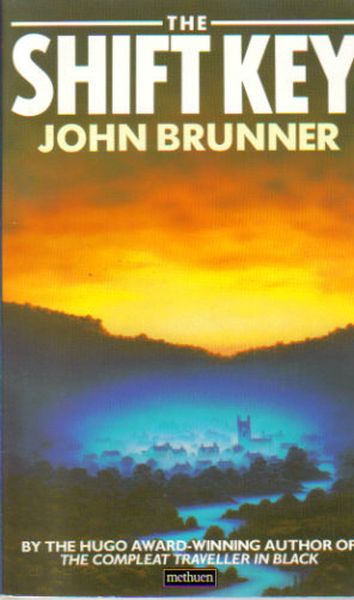Rending My Ribbon
The Shift Key
By John Brunner

27 Aug, 2024
John Brunner’s 1987 The Shift Key is a stand-alone novel.
Usually, I start out by telling readers the genre, but in this case revealing the genre would be a bit of a spoiler. Read on!
Weyharrow Goodsir’s name is the oddest aspect of an otherwise unremarkable British village. Weyharrow has no crime-solving spinsters, no outbreaks of murder, not even the occasional alien mass-impregnation events so common elsewhere in the UK. Such crises that Weyharrow experiences are interpersonal, unremarkable, and entirely conventional.
Until the day the town goes mad.
Otherwise sensible people misstep in uncharacteristic ways. A writer discovers that the file he is certain he saved has somehow vanished. A farmer drives cattle into a field he believes he has leased, trampling the turnips the actual leaseholder had planted. A closeted lesbian spinster climbs into bed with an alarmed lodger whom the spinster is suddenly convinced is her lover. A minister gives a deranged sermon. A doctor provides absurd medical advice. A tour guide provides her tour with nonsensical pseudoscience. A doting stepfather wakes up convinced that his stepdaughters are boys.
While it takes some time for the victims to grasp that they are operating under delusions, the bizarre behavior is immediately obvious to enraged neighbors, alarmed tenants, aghast parishioners, and so on. The only comfort available to the mortified victims is that they are not alone. For some, this is insufficient.
A cast far too large to name individually wrestles with the trauma. Each inhabitant has an answer plausible to them: demons, aliens, psychic events. Determining which answer is the correct answers falls to the institution that is the backbone of all decent urban cultures: hard-working, inquisitive, insightful community journalists!
~oOo~
Nothing inspires foreboding in a writer quite like Brunner’s “And even though he hadn’t had time to print it out or even make a backup copy, it would be safe on the disc.” It was not safe on the disc. In fact, it was gone forty words later. I suspect Brunner had a real world, personal, inspiration for that plot element.
I had hoped that Brunner would get through an entire novel without characters angrily berating other characters for failing to see the obvious. Alas, this is not that novel. He almost managed it and then the compulsion took over.
This is Brunner’s John Wyndham novel, in which regular British people are confronted by disruptive events. Unlike most Wyndham novels1, in this novel the cause of the catastrophe is not immediately obvious. The intrepid reporters do eventually connect the dots for everyone, but before that happens, the novel is largely taken up with abject embarrassment — fatal, in one case — calamitous social consequences, and confused theorizing.
Brunner’s point in the novel is obvious, but in just in case some readers miss it, he’s kind enough to have a character summarize it:
Every community nowadays needs a reporter, or someone who can be relied on to blow the gaff, at least. Every community needs someone who can look beyond the comfortable habits of the past and say, ‘This might be dangerous — this might be fatal!’2
The Shift Key is an oddity. It is a late Brunner that not only had I never read, I had never even heard of it until I began assembling Brunner works for this review project. The explanation is obvious: this is a rare Brunner that had no North American edition, only British and (presumably soup-free) German editions. How odd.
The Shift Key is certainly not a major Brunner, but it is a pity it is obscure as it is.
The Shift Key is available here (Amazon US), here (Amazon Canada), here (Amazon UK), here (Apple Books), here (Barnes & Noble), and here (Kobo).
I did not find The Shift Key at either Chapters-Indigo or Words Worth Books. I suspect this is because The Shift Key is only available as an ebook. Still easier to acquire than The Great Steamboat Race.
1: The Day of the Triffids being a partial exception. Yes, it’s pretty obvious why various people died — neither plague nor triffids are subtle — but where triffids really came from and why almost everyone went blind are questions whose answers are conjectures.
2: Of course, the fatal flaw in Brunner’s proposition is that he ignores a journalist’s first duty, which is to shield society’s betters from embarrassment or litigation even should this require allowing apocalyptic events to carry through to their inevitable conclusion. This first duty is why modern journalism is prudently centralized under a few oligarchs who can be trusted to keep their reporters in line.
